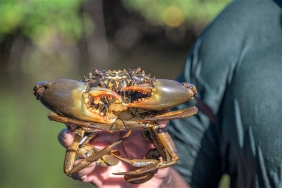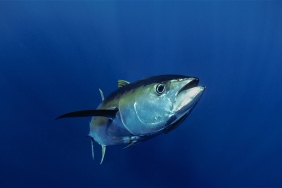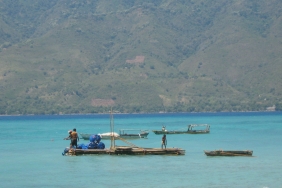PANDA MOBILE AND SEAFOOD SAVERS COMMEMORATE NATIONAL FISH DAY IN MANADO AND TOMOHON
Panda Mobile and Seafood Savers WWF-Indonesia visited a number of schools in Manado and Tomohon, North Sulawesi in the framework of National Fish Day on November 22-27, 2018. Some of the schools visited were SMA Negeri 9 Binsus Manado, SMA Kristen 2 Tomohon, SMA Kristen 1 Tomohon, SD GMIM 8 Tomohon, and SMA Negeri 1 Tomohon. Participants at the high school level consisted of representatives of student councils, PMR, Paskibra, Scouts and also the Green Community. A total of 247 students from the five schools also participated in the Panda Mobile education activity.
This activity in Manado is the first experience for Panda Mobile in Sulawesi. The program, which targets school-age children, was created with the hope of encouraging the younger generation to protect the environment. In addition, Panda Mobile and Seafood Savers also provided education on how to be a good consumer to support environmental conservation efforts in Indonesia.
On this occasion, Seafood Savers held an educational activity for seafood consumers. Meanwhile, the Panda Mobile team took part in providing education on the issue of waste and its relation to conservation in Indonesia to elementary to high school students. Waste issues became the focus of the activities because it is a consequence of human activities that produce waste. With good waste management on land, we will see the positive impact of these efforts in the surrounding environment, such as rivers and the sea.
Every time Panda Mobile starts its activities in Manado, it always begins with an opening from the school, hosted by Kak Anggi from the Seafood Savers team. Next, an introduction from the Panda Mobile team that explains about WWF-Indonesia. In this segment, Kak Dwi talked about the dangers and how to process waste. Both of these are associated with efforts to protect the sea as a place to live for various living things that are damaged by humans. From the story and presentation, Kak Dwi advised the children to preserve the environment so that marine animals do not become extinct. The children seemed very enthusiastic and interested in the material presented. In addition, there was a presentation from Kak Anggi and Kak Febi about Seafood Savers and becoming ocean guardians.
After getting the material from the presentation, the participants were then divided into several groups to take part in other activities with the Panda Mobile and Seafood Savers teams. In the first post, participants were challenged to answer several questions from Kak Febi according to the presentation material that had been explained.
The next post was a game of cricket accompanied by Kak Dwi. Here, the Panda Mobile team found interesting things. The game known as engklek is called "cenge-cenge" by the Manado people. This game of jumping using one foot on a patch of land is common in almost all parts of Indonesia. However, the name of the game is different in each region. In Java, the game is known as engklek or manda (Sundanese). In other regions, it is called teklek, jlong-jling, dampu or lempeng.
Next in post three, there was Kak Febi who explained about fish ruler, which is a simple measuring tool made to make it easier to calculate the length and size of fish species that are worth catching and worth consuming. Each activity was greeted enthusiastically by the students. In fact, some of the participants were very curious about endangered animals and the environment by asking questions in every question and answer session.
The students were grateful for the educational visit from WWF-Indonesia. "The children are very happy and enthusiastic about getting education about waste, and becoming consumers of seafood that help preserve the marine ecosystem. In addition, we received this conservation message through fun activities," said Arnold, a student representative of SMA Negeri 9 Binsus Manado, at the end of the activity.
The Panda Mobile team hopes that the education provided to students in North Sulawesi can be useful and memorable. After this activity, the Panda Mobile team and Seafood Savers want the waste management that has been carried out at school to be continued consistently at home, and other environments. That way, the WWF program can provide positive benefits, and students and schools can participate in saving the environment.





